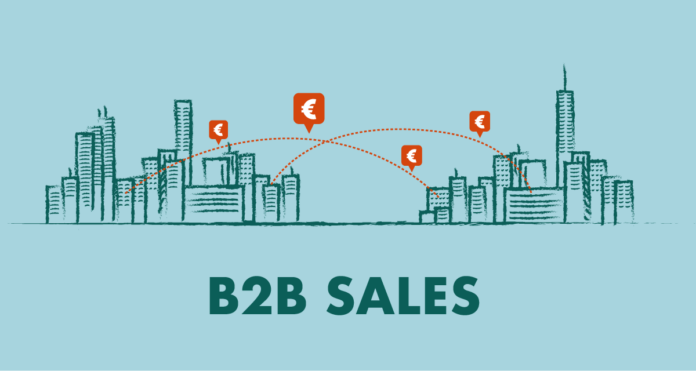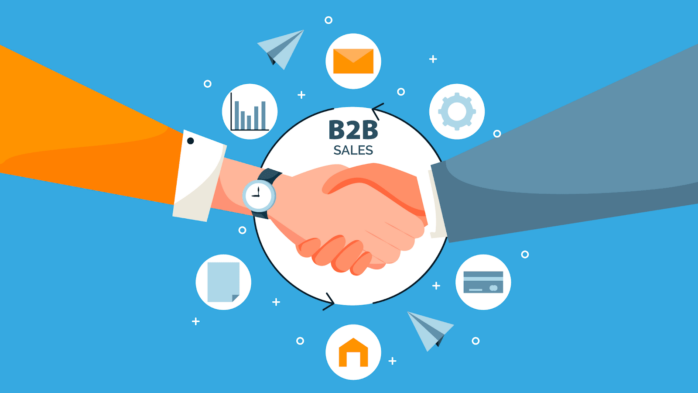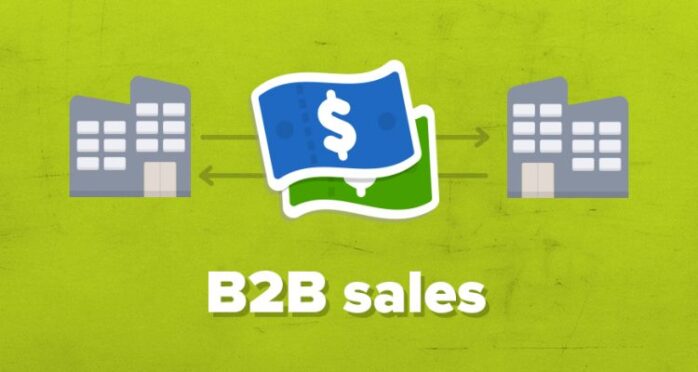
Several studies on customer behavior have demonstrated that consumers require businesses that are familiar with them, understand their wants and context, and give value to their overall experience.
Companies must work with a customer-centric mindset to develop long-lasting connections based on a thorough grasp of their requirements and expectations.
What are B2B sales?

A B2B sales strategy is geared at selling to businesses rather than to individuals. This sort of sale involves the exchange of items or services between two or more companies for monetary consideration in exchange.
Depending on the company’s organizational structure, several departments are typically involved in the decision-making process. Occasionally, there is a purchasing department in charge of the procedure and a department that is the final client or requires the goods or service in question. In other instances, the negotiation is carried out directly with the company’s management team.
These customers have various characteristics that make the transaction more complicated and necessitate using a different sales strategy than B2C customers. They are knowledgeable customers who are more demanding and expect a long-term partnership to secure supply and mutual benefits for both parties.
To achieve a good sales B2B strategy, they spend more time in the analysis stage of the possibilities and search for b2b sales consulting before making a selection than the average person. They also pay attention to the B2B sales funnel, in which leads are gathered and processed through several levels of contact until they complete a purchase or exit the funnel. You can discover more about it now and continue reading to find out what are the top factors for success in your B2B sales strategies.
Knowledge of the environment

Let’s get right to the point of what we’re searching for. We must be familiar with the market to develop an effective B2B sales strategy. What companies are your competitors? What do you believe to be your competitive advantage? What services do you provide to customers? You never sell a product or service in reality; instead, you sell a solution to a problem. In other words, how well do you understand the value of your product to your customer?
Internal and exterior knowledge of one’s environment are necessary for survival. Having a firm grasp of the benefit we deliver to our clients and our competitive advantage will be highly beneficial in reaching our target customers.
All of this knowledge must result in some sort of data. The information must be thoroughly studied to establish the groundwork for our goals and objectives. What are the people who purchase our products? How much do we sell daily? Do you know how many people are selling our products?
You must be able to answer all of these questions and thoroughly examine the information you acquire from answering these same questions. We will only be able to define SMART targets if we first understand ourselves, then understand the market and our customers. These are the goals that our sales staff will strive to reach to meet the organization’s plans for itself.
Expertise in a technical field
Having a high level of technical understanding of a product, its processes, and the industry helps establish trust. Because of this, it is easier to resolve the customer’s problems and provide realistic options to them.
The art of negotiating

Negotiation is a critical skill for any B2B salesman to possess. Meetings with executives from giant corporations, purchasing managers, and professional negotiators will be commonplace for you.
Communication
A good B2B salesperson is skilled in the areas of spoken communication, written communication, and body language. They persuade by their words, show confidence, and convince others of his position.
Trust and empathy are essential
In B2B sales, the seller’s job is to create an atmosphere of trust and empathy. Knowing the customer’s firm, the company they represent, trade news, and even current news from around the country and the world, and basic cultural information are all critical.
This will allow you to come up with discussion starters, break the ice, learn about the customer’s point of view on various issues, and discover connections between those issues and your product or your organization.
Emotional Intelligence is a skill that can be learned
Success in sales necessitates emotional Intelligence, which includes knowing how to respond appropriately to irritation, worry, fear, failure, and anything else that may arise in the course of a salesperson’s day-to-day activities.
A thorough understanding of the customer
Customer knowledge gives a competitive advantage because it enables a company to be more assertive in the value proposition to customers. To begin developing a B2B sales funnel, you must first establish a well-defined Ideal Customer Profile (ICP). This necessitates market research into the areas where your potential clients are located, as well as an examination of the purchasing patterns of your current customers. It is feasible to develop personalized tactics to attract the appropriate companies based on this information.
Proposal
Present three different choices that take into consideration different scopes and budgets. The customer will be able to select the proposal that best meets their requirements in this manner. Negotiation and patience are required during this stage, as a number of different decision-makers will assess the document until the contract is signed.
Valuable content

Provide your present and prospective clients with helpful material tailored to their specific needs. This elevates you above the level of the salesperson, who is concerned with closing a sale, to that of the consultant, who is concerned with his client’s growth, the resolution of his difficulties, and the willingness to accompany him through each stage of the B2B sales process.
A robust Content Marketing plan is necessary for any organization, but it is essential for those who cater to B2B customers. This is because effective materials assist the audience in recognizing the challenges they are experiencing and appreciating the value of your solution. The company will produce excellent Leads through this content, who sales representatives will then approach.
Implementing an omnichannel strategy
It is essential that your sales approach is omnichannel and consistent across all channels and platforms. The consumer must be treated in the same manner, regardless of the medium via which they communicate with your company.
Success tales and quantitative data
This type of customer requires arguments backed up by measurements and success stories to move forward with more peace of mind and make a final decision.
Bringing sales to a close

Keep two essential considerations in mind: the first is to speak directly to the decision-maker, and the second is to close the transaction in person. Do not try to save money on travel expenses because face-to-face interaction is critical because it fosters trust and empathy in this form of selling.
It’s important to remember that B2B sales don’t finish with the signing of the contract. After-sales service is critical in maintaining a company’s success with the purchased product. Consequently, once the sale has been accomplished, the company must invest in excellent customer service and maintain contact with the consumer to ensure contract renewal and even possible referrals from other customers.





